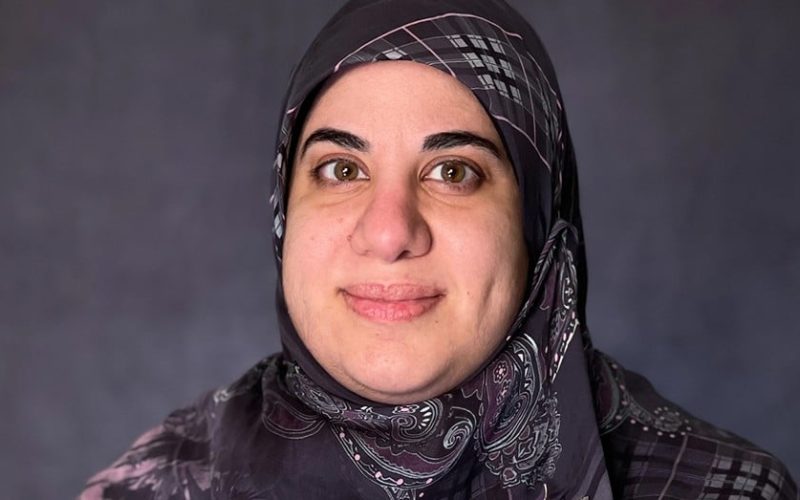Business
Honoring the Legacy of Michigan Advocate Zahra Abbas

The Michigan cannabis community has lost a great advocate among its ranks recently.
The cannabis community suffers great losses in the passing of its community members, but today it is with great regret that we report the passing of Michigan cannabis advocate and political activist, Zahra Abbas, who was 35 years old.
The Cannabis Caucus of the Michigan Democratic Party for which she held the position of Chair announced her passing on July 28. “Without Zahra the Cannabis Caucus would not be what it is today and the world is a lonelier place without her presence,” the Caucus wrote online. “Our deepest condolences to her family and friends. We know she touched many all across this great state and beyond.”
Abbas was a prominent figure advocating for cannabis as a patient herself, and sought to spread the word about cannabis and its medical benefits. “Zahra was dedicated to teaching the world about the health benefits of cannabis and helping lead the progressive movement action to remedy the catastrophic consequences of the war on drugs,” the post continued. “Zahra was frequently failed by our healthcare system and cannabis prohibition that would at times deny her the only medicine that could bring her seizures under control.”
Detroit’s Metro Times reported on Zahra’s passing, describing an interview they conducted with her in 2017. At the time, she suffered from daily seizures that were not solved through brain surgery or prescription medication—but cannabis was a game changer for her.
“As soon as I started it, within a few days my seizures stopped,” Abbas told Metro Times in 2017. “Before I started looking into it for epilepsy I was very much against marijuana because there was so much misinformation around it. It came to the choice between using that and having another brain surgery to control my seizures. … Turning to cannabis was kind of my last resort.”
She volunteered to gather signatures for the legalization ballot that appeared before voters in 2018, in hopes that others could utilize cannabis just as she did. “I’m doing this because I think more people should have access to cannabis because it helps all people,” she told Metro Times. “It should be everybody’s right to use it,” she added.
But her journey into the cannabis industry had only just begun. Her advocacy grew, and she later became Vice Chair and, later, Chair of the Cannabis Caucus, and also Vice president of the Detroit chapter of Motor City NORML. She had an instrumental role in commuting the sentence of Michael Thompson, a man convicted of a cannabis crime who had survived 60 years in prison.
Fellow advocate Jamie Lowell told Metro Times that at one point, Abbas had to quit cannabis in order to pass a drug test for a new job, but her seizures returned. “She soon had a major seizure and vowed to not quit again for anything,” Lowell said. “After resuming, she was again seizure-free. This was her powerful and amazing testimony.”
Speakers at a rally featuring Sen. Bernie Sanders, which was held in Pontiac, Michigan on July 29, took a moment to honor Abbas’s memory. Rep. Rashida Tlaib called Abbas “an incredible warrior.” “Her heart was full of love for community, and there wasn’t a cause that she did not take on … 100%,” Tlaib said. “She was one of our biggest advocates for health care and access to alternative approaches, including cannabis … and she never gave up the fight. She will be sorely missed. I know that she is with us today.”
Also present was Dr. Abdul El-Sayeda who previously ran for Michigan governor in 2018, whose spoke about Abbas’s selfless dedication to the cause. “She took her pain and she used it to bring people together, to fight for all of the things that she herself was denied, recognizing that it could have been anyone else,” El-Sayeda said. “She took that pain and decided to make the world that much better.”
“Zahra didn’t have very much time, but Zahra put all of herself into the time she had,” he added.
Source: https://hightimes.com/activism/honoring-the-legacy-of-michigan-advocate-zahra-abbas/
Business
New Mexico cannabis operator fined, loses license for alleged BioTrack fraud

New Mexico regulators fined a cannabis operator nearly $300,000 and revoked its license after the company allegedly created fake reports in the state’s traceability software.
The New Mexico Cannabis Control Division (CCD) accused marijuana manufacturer and retailer Golden Roots of 11 violations, according to Albuquerque Business First.
Golden Roots operates the The Cannabis Revolution Dispensary.
The majority of the violations are related to the Albuquerque company’s improper use of BioTrack, which has been New Mexico’s track-and-trace vendor since 2015.
The CCD alleges Golden Roots reported marijuana production only two months after it had received its vertically integrated license, according to Albuquerque Business First.
Because cannabis takes longer than two months to be cultivated, the CCD was suspicious of the report.
After inspecting the company’s premises, the CCD alleged Golden Roots reported cultivation, transportation and sales in BioTrack but wasn’t able to provide officers who inspected the site evidence that the operator was cultivating cannabis.
In April, the CCD revoked Golden Roots’ license and issued a $10,000 fine, according to the news outlet.
The company requested a hearing, which the regulator scheduled for Sept. 1.
At the hearing, the CCD testified that the company’s dried-cannabis weights in BioTrack were suspicious because they didn’t seem to accurately reflect how much weight marijuana loses as it dries.
Company employees also poorly accounted for why they were making adjustments in the system of up to 24 pounds of cannabis, making comments such as “bad” or “mistake” in the software, Albuquerque Business First reported.
Golden Roots was fined $298,972.05 – the amount regulators allege the company made selling products that weren’t properly accounted for in BioTrack.
The CCD has been cracking down on cannabis operators accused of selling products procured from out-of-state or not grown legally:
- Regulators alleged in August that Albuquerque dispensary Sawmill Sweet Leaf sold out-of-state products and didn’t have a license for extraction.
- Paradise Exotics Distro lost its license in July after regulators alleged the company sold products made in California.
Golden Roots was the first alleged rulebreaker in New Mexico to be asked to pay a large fine.
Source: https://mjbizdaily.com/new-mexico-cannabis-operator-fined-loses-license-for-alleged-biotrack-fraud/
Business
Marijuana companies suing US attorney general in federal prohibition challenge

Four marijuana companies, including a multistate operator, have filed a lawsuit against U.S. Attorney General Merrick Garland in which they allege the federal MJ prohibition under the Controlled Substances Act is no longer constitutional.
According to the complaint, filed Thursday in U.S. District Court in Massachusetts, retailer Canna Provisions, Treevit delivery service CEO Gyasi Sellers, cultivator Wiseacre Farm and MSO Verano Holdings Corp. are all harmed by “the federal government’s unconstitutional ban on cultivating, manufacturing, distributing, or possessing intrastate marijuana.”
Verano is headquartered in Chicago but has operations in Massachusetts; the other three operators are based in Massachusetts.
The lawsuit seeks a ruling that the “Controlled Substances Act is unconstitutional as applied to the intrastate cultivation, manufacture, possession, and distribution of marijuana pursuant to state law.”
The companies want the case to go before the U.S. Supreme Court.
They hired prominent law firm Boies Schiller Flexner to represent them.
The New York-based firm’s principal is David Boies, whose former clients include Microsoft, former presidential candidate Al Gore and Elizabeth Holmes’ disgraced startup Theranos.
Similar challenges to the federal Controlled Substances Act (CSA) have failed.
One such challenge led to a landmark Supreme Court decision in 2005.
In Gonzalez vs. Raich, the highest court in the United States ruled in a 6-3 decision that the commerce clause of the U.S. Constitution gave Congress the power to outlaw marijuana federally, even though state laws allow the cultivation and sale of cannabis.
In the 18 years since that ruling, 23 states and the District of Columbia have legalized adult-use marijuana and the federal government has allowed a multibillion-dollar cannabis industry to thrive.
Since both Congress and the U.S. Department of Justice, currently headed by Garland, have declined to intervene in state-licensed marijuana markets, the key facts that led to the Supreme Court’s 2005 ruling “no longer apply,” Boies said in a statement Thursday.
“The Supreme Court has since made clear that the federal government lacks the authority to regulate purely intrastate commerce,” Boies said.
“Moreover, the facts on which those precedents are based are no longer true.”
Verano President Darren Weiss said in a statement the company is “prepared to bring this case all the way to the Supreme Court in order to align federal law with how Congress has acted for years.”
While the Biden administration’s push to reschedule marijuana would help solve marijuana operators’ federal tax woes, neither rescheduling nor modest Congressional reforms such as the SAFER Banking Act “solve the fundamental issue,” Weiss added.
“The application of the CSA to lawful state-run cannabis business is an unconstitutional overreach on state sovereignty that has led to decades of harm, failed businesses, lost jobs, and unsafe working conditions.”
Business
Alabama to make another attempt Dec. 1 to award medical cannabis licenses

Alabama regulators are targeting Dec. 1 to award the first batch of medical cannabis business licenses after the agency’s first two attempts were scrapped because of scoring errors and litigation.
The first licenses will be awarded to individual cultivators, delivery providers, processors, dispensaries and state testing labs, according to the Alabama Medical Cannabis Commission (AMCC).
Then, on Dec. 12, the AMCC will award licenses for vertically integrated operations, a designation set primarily for multistate operators.
Licenses are expected to be handed out 28 days after they have been awarded, so MMJ production could begin in early January, according to the Alabama Daily News.
That means MMJ products could be available for patients around early March, an AMCC spokesperson told the media outlet.
Regulators initially awarded 21 business licenses in June, only to void them after applicants alleged inconsistencies with how the applications were scored.
Then, in August, the state awarded 24 different licenses – 19 went to June recipients – only to reverse themselves again and scratch those licenses after spurned applicants filed lawsuits.
A state judge dismissed a lawsuit filed by Chicago-based MSO Verano Holdings Corp., but another lawsuit is pending.
Source: https://mjbizdaily.com/alabama-plans-to-award-medical-cannabis-licenses-dec-1/
-

 Business2 years ago
Business2 years agoPot Odor Does Not Justify Probable Cause for Vehicle Searches, Minnesota Court Affirms
-

 Business2 years ago
Business2 years agoNew Mexico cannabis operator fined, loses license for alleged BioTrack fraud
-

 Business2 years ago
Business2 years agoAlabama to make another attempt Dec. 1 to award medical cannabis licenses
-

 Business2 years ago
Business2 years agoWashington State Pays Out $9.4 Million in Refunds Relating to Drug Convictions
-

 Business2 years ago
Business2 years agoMarijuana companies suing US attorney general in federal prohibition challenge
-

 Business2 years ago
Business2 years agoLegal Marijuana Handed A Nothing Burger From NY State
-

 Business2 years ago
Business2 years agoCan Cannabis Help Seasonal Depression
-

 Blogs2 years ago
Blogs2 years agoCannabis Art Is Flourishing On Etsy













